#silmarilli
Text

And finally here I come with a Moringotto aka the guy who thought it was a good idea to work with a giant spider…🙈
Prints and other stuff on my RedBubble and Threadless
#moringotto#morgoth bauglir#morgoth#melkor#vala#valar#the silmarillion#silmarilli#tokien#jrrt#the great enemy#wisesnail#my art#speed paint
883 notes
·
View notes
Text

dis guy
i think after a few years im starting to remember all the stuff that happened in the silm
#fanart#art#artists on tumblr#artwork#digital art#tolkien#j r r tolkien#lotr fanart#lotr#silmarillion#the silmarillion#silm art#silm#the silm fandom#tolkien fanart#morgoth#melkor#morgoth bauglir#valar#silmarilli#hes such a villian 🤬🤬 hate him
81 notes
·
View notes
Photo


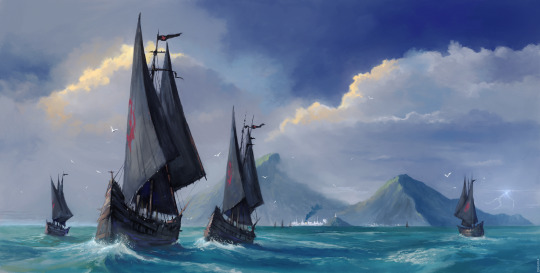

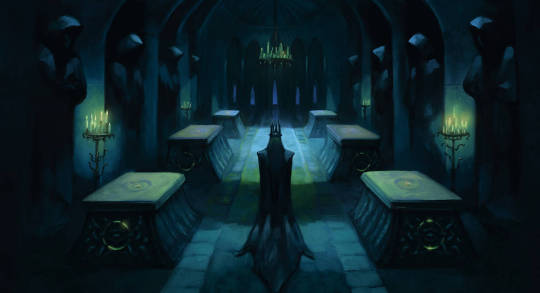
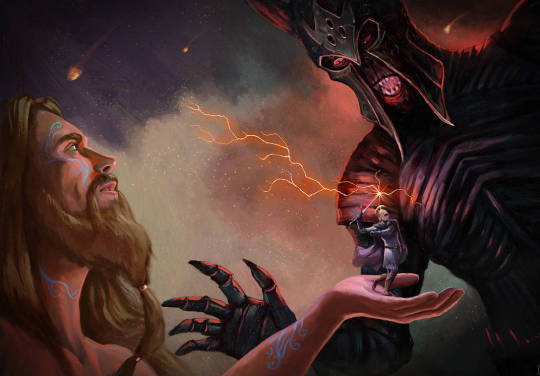
Legendarium by ralphdamiani
1. Sauron, the Deceiver
2. Feanor & Silmarilli
3. Umbar Armada
4. The White Flame (Earendil & Melkor)
5. The Vault
6. Iron of Death (Melkor, Tulkas, Turin Turambar)
#tolkien#jrrt#jrrtolkien#jrr tolkien#the silmarilion#silmarilion#elves#feanor#silmarills#silmarilli#umbar#sauron#the hobbit#hobbit#lord of the rings#The Lord of the Rings#LOTR#Annatar#earendil#melkor#morgoth#turin#tulkas#Turin Turambar
341 notes
·
View notes
Text
Silmarilli Ownership
Your honor, in this debate over whether the Silmarils belong in the sky, with the Feanorians, or hanging out in Doriath, I call to the stand The Silmarils. Let's ask them what they want to do with their life.
#late night chats that lead to these deep dive discussions#sorry that last tag was not meant to be a joke about the one at the bottom of the sea#no one ever asks the silmarilli for consent do they?#silmarils#silmarilli#how to procrastinate when I should be grading things
15 notes
·
View notes
Text
It’s massively ironic that the one Silmaril still accounted for wound up in the hands of a descendant of Fingolfin
How spitting mad do you think Fëanor was when he found out?
82 notes
·
View notes
Text
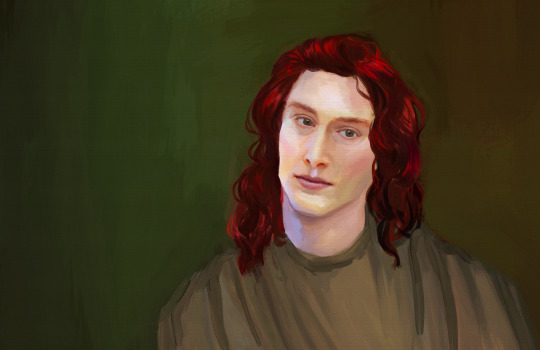
Maitimo
#maedhros#maitimo#feanorians#feanor#silmarillion#silmarilli#silmaril#feanor curufinwe#maedhros fanart#silmarillion fanart#lotr#tolkien#tolkien fanart#procreate#elf#noldor
35 notes
·
View notes
Text
barrier breaking silmarils
All this time spent questioning the Valar’s choice to refuse all ships from Beleriand except the one with the Silmaril only to come to the realisation it is a non-issue because the Valar never actually decided to make an exception to let Eärendil and Elwing through.
Vingilot makes it through across the Great Sea where the other ships fail because the Silmaril disrupts the barrier fencing Vailnor allowing them passage, just as it disrupted the Girdle of Melian from Carcharoth’s stomach to enable the werewolf to penetrate Doriath. Maybe it’s fate these things happened, as fate let Beren slip into the forest of Neldoreth, but the Ainur had nothing to do with it.
That is the reason there was no one waiting to meet Vingilot at the shore, why there was nobody waiting in Tirion and Eönwë only appeared after Eärendil had searched the city. Nobody knew they were coming (except perhaps Ulmo and Vairë).
And so the Valar relent not because they have been bribed with a Silmaril but because Eärendil succeeds in pleading the case of the peoples of Beleriand to them, not in prayers that maybe only a single Ainu will hear, but to the collective council of the Aratar with the Vanyar, Falmari and Ñoldor gathered for the festival there to hear all.
The Vanyar, who have spent centuries chilling in the bliss of Aman, hearing about the shit Morgoth and pals have been up to (◡‿◡✿) (ʘ‿ʘ✿) (ʘ‿ʘ)/✿ ✿\(。-_-。)
#Tolkien Legendarium#silmarillion meta#silmarilli#Eärendil Ardamírë#the Valar#the Fencing of Valinor#the Doom of Mandos#a wild headcanon appeared
10 notes
·
View notes
Text
the matter of beleriand belongs to my father and i belong to him
8 notes
·
View notes
Text
Thinking about Maedhros and Helen of Troy, and just - their stories are so different it’d be hard to make a fusion AU work and yet they’re so very alike?? The beauty, the imprisonment, the anger at the gods, the sense of crushing guilt and responsibility for things you are not strong enough to change. The heaviness of Fate on your shoulders. You’re not the (sole) enactor of this tragedy but you are its focal point and its symbol. Your role in the story is Who You Are and yet it is antithetical to you; to hate it is to hate yourself, and you would not be yourself if you did not hate it.
#maedhros#silm#tolkien#helen of troy#the iliad#the beauty is the least of it really#although. it does strike me that if you merged maedhros with the silmarilli#you'd get helen
91 notes
·
View notes
Text
I've always liked the scene in The Lord of the Rings when Galadriel gives Frodo the light of Eärendil anyways I'm reading The Silmarillion and I no longer like it
#please feel free to ignore this#I'm reading The Silmarillion#I knew the story of the Silmarilli was like. fucked up. but. um.
2 notes
·
View notes
Text
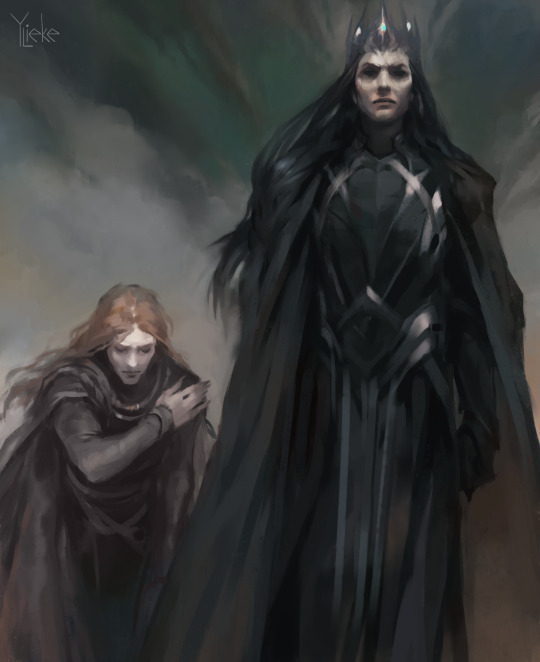
"And Melkor entered his realm. And the Dark bowed before its Lord, and came apart in the light of Silmarilli. The creatures of the night prostrated themselves on the ground in hopes that they would be spared and his heavy gaze wouldn’t fall on them. Sauron bowed low, pinned down by the terror that like a cape was draped over the Fallen Vala. He relinquished all the power he held in his absence and laid it for him, as a servant must."
An illistraion for the "Play with fire" fanfic by @eternal-fear
#my art#silm art#silmarillion#the silm fandom#the silmarillion#melkor#sauron#play with fire#fireplay#the silm#silmarils#silm fic#silmart#fantasy art#fantasy character#silmarillion fanfiction#fanfic#fanfiction
1K notes
·
View notes
Text
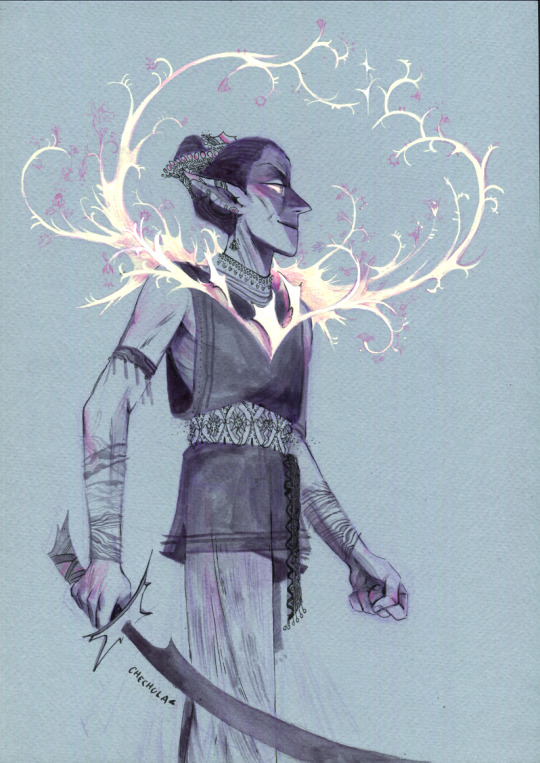
Feanor and Silmarilli...the light captured inside gems is of tree origin so I wanted to draw it spread like branches ♥
(it was only a doodle where I tried that light-spreading idea. But my sis saw it, liked it(I guess?), redrawn anatomy.... and made Feanor so good-looking that I had to finish it :D )
742 notes
·
View notes
Text
Melkor and Feanaro have such wonderful parallels. Both were literally told that their works are not their own and stem from some other. (Melkor's additions to the Song and Feanaro's Silmarilli.) And both took it so badly that it permanently fucked Arda in so many ways.
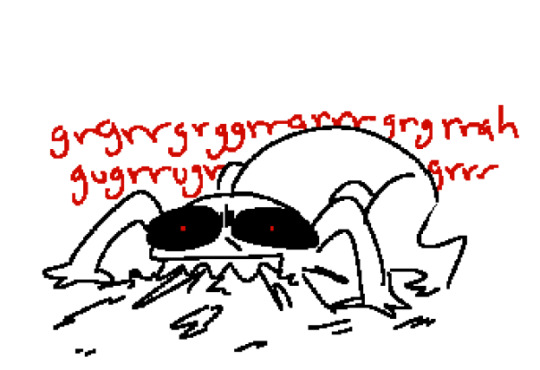
#melkor#feanor#silmarillion#I have so many thoughts about them#they're both so terrible and so brilliant#ohhh their hubris
106 notes
·
View notes
Photo

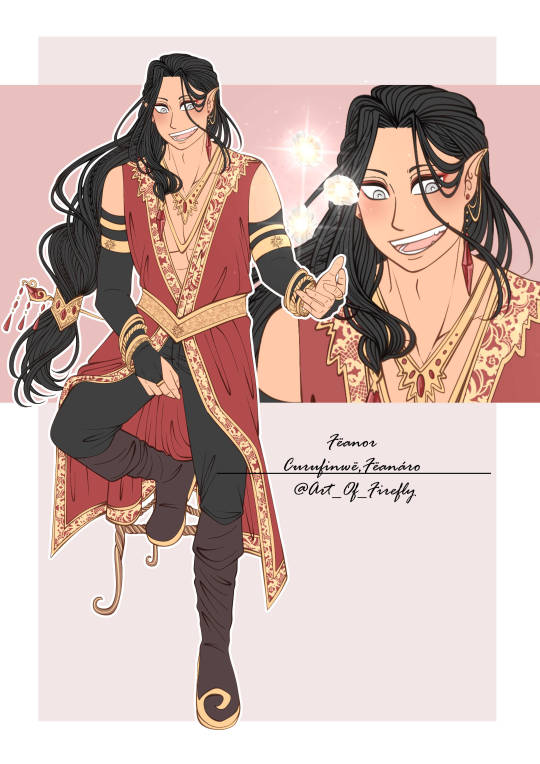

Fëanor
Red and gold like Míriel, I redraw him so many times at every step because i couldn't get him right. With two versions, prince and king.
I imagine the silmarilli perfectly oval and smooth (like the Arkenstone but much brighter) but i prefer to draw them like rocks with hard edges.
Tomorrow i’ll post Findis !
156 notes
·
View notes
Text
Merry Christmas @morifiinwe - I’m your Secret Santa for the @officialtolkiensecretsanta gift exchange! With a Fëanorian prompt, I have put together a piece around a part of canon that I don’t see explored often - the breaking of the Silmarils, and renewal of the world, after the Dagor Dagorath in the end of days. This was really interesting for me to write - I’ve actually never written Fëanor in a fic before - so I hope you enjoy!
x
Beyond count were the years that had passed since the Three had lain before him, millennia unravelled unto the birth of civilisation, to the deepest memories of Arda in her prime.
Fëanor shivered in their light, exultant and in awe, for though grief and toil had befallen the world about them, still the Silmarilli were sacrosanct, they were perfect.
War had come, the Last Battle long foretold; the skies fell black, the stars and moon throttled out in shadow, and chaos was unleashed. The lands bled, fractured in tumult; great hosts arrayed in shining silver and white carved across the wide plains of Valinor, and opposite them the Enemy, hosts of demons and orcs summoned from the blackest pits of the earth, they churned those verdant fields to mud. At last it was over; all Eä watched with bated breath as the Great Foe was slain by the sword of a Man, the Accursed and all his foul servants at last extinguished, and never to rise again to trouble the weary earth.
For a while then all was good; the glorious dead awoke once more within the Halls of Mandos, in strength and vigour renewed, all hurts washed away, as shadows fled before the glimmering dawn. And though the lands still bore the scars of their conflict, once more gaiety and laughter returned to the hearts of the Eldar, and their joy flowed forth, from their cities made hale once more to the most desolate of places. Even unto the farthest reaches of the Pelóri once more singing was heard, in gladness not heard since the Two Trees had stretched their mighty boughs above golden Tirion, and the songs of the Eldar filled the skies with light.
Kindred long sundered walked again hand in hand, and though all rejoiced in their hard-won peace, for all the pleasures of those blissful times, still there was memory, there was hurt; Irmo wove both dream and nightmare, and Estë's calming halls were ever-full, Nienna yet wept for the sorrows of the world, for the threads of Fate were not yet fully unravelled. For though all the Eldar wished it so, the injuries of the past were not fully healed, not yet; the Trees still stood barren and grey above ashen Tirion, their branches brittle and trunks gouged, and the songs of the Eldar grew hushed and forlorn beneath them.
The time had come, it was proclaimed; below Formenos' fortressed walls the words were said, though if it were proclaimed by Fëanor, son of Finwë, or for him, he did not truly know. The time of the Silmarils was ended, the people whispered; crucibles of joy and cruel catalysts of pain, as all things must pass so too should they, to heal the Trees, to heal the world, to begin an Age anew.
Long had it been rumoured that this day would come, and long had Fëanor spent in thought of what he might do if it should come to pass, as a deep disquiet upon his soul this thing had lain within him, it had eaten him away. He bade it be silent, and though part of him quarrelled against it he laid in place what he must; he was ready, he thought, for when it came, for when it surely must come, yet unveiled at last before his doorstep still it pained him, and the doubt of his decision was as a raw nerve plucked beneath his skin.
It was only fitting, though; it was only right, a smirking note of pride hummed within him even as his procession wrote his doom. From maker to destroyer the fates had foretold it must be so; to the snow-capped heights of Taniquetil, most holy place upon these lands, he was summoned, and so he came alone. For none else should challenge the might of the Silmarilli, they had not the wit, he scoffed, not the subtlety. Even the lofty Valar dared not attempt it, for fear of what they might unleash.
Nay, he thought, and smiled to himself, they had not the right to do so.
From Air, Sea, and Earth the Three had been called; the First borne out of the stars, held proud upon the bow of Tilion's silver ship; the Second, swept up on a great wave out of the Sundering Seas, and the Third excavated out from under the earth, quarried out from rock and flame by Aulë's skilful folk. All Three were gathered, all brought to this place, to this time; into the highest atrium of Taniquetil's palace, open-aired to the endless stars above, Varda and Yavanna bade him enter. To the sides of a long table they stood, and between them, set upon a bolt of obsidian cloth lay the Three, and as he entered the chamber how his heart leapt to behold them.
They were as clear and brilliant as the day he had wrought them; their light undimmed, ever-shining, a rich honey-silver near cutting in its clarity. How long had it been since they shone upon his breast; his breath caught in his throat as wondrously he gazed upon them, as dear to him as children, and precious beyond measure of mortal gold or jewels. He loved them still, a fierce rush of delight seared through his veins, a tale of bloody war they had sliced across history, and yet still he coveted them, his jewels, his Silmarilli, his heirloom and weregild. With vicious delight he looked upon them, and to their maker they hearkened; the secret flames within them kindled to light yet purer than before, sweet as dawn, and cold as the everlasting stars.
For a moment then he wavered, pride grappled with purpose within his heart, for before their radiance how his purpose suddenly seemed hollow, stripped bare of all grace to reveal its squalor. For to break the Silmarils would be an insult beyond measure; anger clenched through his stomach; to snuff out their light was a cruelty, an unbearable spite, if their destruction should be the redemption for a world then the price was too steep. His pulse beat hard within his throat, his heart hammered against his ribs; he stood before the mightiest of the Valier, Varda incandescent with terrible light, Yavanna crowned in pale spring flowers, he stood subject before them yet he might hold all Eä to ransom.
He had done it before, in wrath and vengeance he had defined an Age; he could do it again, he thought, and he would. For he had not forgotten those words he swore long ago, amid torchlight and shining swords, bold and fey before Doom and all the world, that terrible Oath that even the Valar feared to speak. It glimmered in his blood still, the echoes of its power swirled there; dread nor danger, nor Doom itself, woe unto world's end... Though his long recumbence in Mandos' halls had cooled him, there was power within him yet that would brook no challenge.
Tall and proud he stepped forward now, he reached out his hand to his Silmarils long beloved. Yet even as his fingers brushed their cool facades suddenly they flickered, the light within them shivered but for a moment, before shining on once more, but in cold dismay Fëanor's heart was stilled. For though now steadied, something within the jewels had changed; where once flowing clear as fresh spring water now their light seemed veiled, cloudier, thick with secrets.
Upon the First of the Three he looked, his brow furrowed; once borne aloft on the breast of Eärendil the Mariner, and fleet Elwing, granddaughter of Lúthien the Fair, it gleamed before him as a meteor fallen to earth, and within it he saw slaughter. Upon its glassy surface cities crumbled; white flames leapt high over shattered towers, over broken homes, and in his ears he could hear the din of battle; the croaking wounded, the silent dead, and those in between yet gasping for life. Bright axes clove through flesh, through wrack and ruin there his sons strode; Caranthir bellowed, ruddy-cheeked as his greatsword swung; cunning Curufin whispered, lies slithered over his lips as beneath him a kingdom's foundations trembled. Swift Celegorm grasped at a raven-haired maid, his eyes sharp as knives and a sneer upon his face, and all about him was tumult, chaos black and roaring as the world emptied into it; the guttural grinding of war and the howls of those who stoked its fury. For everywhere his banner gleamed; an eight-pointed star dripping in gore, a war in his name, seething now to bloody crescendo.
With difficulty he tore his gaze aside, his breath came hard into his lungs, it skewered in his throat, and once steadfast now he wavered. From the ends of the table the Valier looked at him, motionless, their stern faces impassive.
Upon the Second of the Three, dredged up from the depths, his gaze at last came to rest. He could smell the brine on it, and the silt in which it had lain, thick and cloying. There was stillness in this one, and sorrow; though its light still shone clear it was paler than the others, opalescent and cool. And as he turned his thought towards it how clearly he could hear the rush and swell of waves, the hiss of foam breaking upon wind-swept sands, the lonely cries of gulls and whimbrels scattered upon a distant shore. The wildness of the place purred in his heart, and suddenly he longed for the vast plains of Beleriand stretched out under the stars, its rugged coasts and deep, cool forests, untameable and endless, full of potential. Yet amid the land's splendour so too came sorrow, a melancholy tune laid upon the wind; a lone piper walked ever along those unforgiving cliffs, playing a strong and stirring melody that brought an ache to his bones, wounds etched in flesh and soul alike. On and on the piper played, in grief before the Sundering Sea, gentle Maglor there forever doomed to walk, until the seas arose in wrath, and what became of him then the stories would not tell. His youngest, Ambarussa, flame-haired and fey, they flitted amid barren hills, outcast and leaderless through fields trampled and burned, driven out unto the edges of the world.
They had lost their way, he thought, and grieved; tears glimmered upon his cheeks as suddenly he swayed, he leaned an arm upon the table before him to steady himself. Still the Valier watched him, unmoving, but for the glimmer of pity in Varda's fathomless eyes.
He could scarcely bear to look upon the Third. He dreaded what it might hold.
For here was a Silmaril that had known torment, and blackest despair. From the brightest flame of his forge it was birthed, largest and most brilliant of the Three, its light burned hungrily, and yet to fire was it in the end born, stolen thrice over, and in the end, immolated. He could feel the hurt laid into its glass, emotion clotted in his chest as he felt the scarred palm that clutched it, he felt the prickle of its light upon his skin, drenched in blood of self and kin, from violent life it had wrought a violent end. He could hear the breath of his son, his firstborn, his son; frantic at first, laboured, strung thin with pain. And then those breaths turned to chokes, as the ash filled his lungs, as flame drove the air from his chest, and still the Silmaril burned, through charring flesh, through melting sobs, it burned brighter than all the consuming fires of the earth, until those desperate sobs were stilled, and flesh crumbled away, and only It remained.
Tears fell freely down his cheeks now, for the pain of Maedhros' passing was yet too great for any father to bear. With bittersweet sorrow he had awaited his son within the Halls of Mandos, to greet him with love, as he had the others, to hold him, to hug him, to lay hurts to rest and to heal. So eagerly he had awaited him, his firstborn, his greatest pride, and yet he had not come. He had not come, and all of Valinor questioned why, and though he too had wondered why it was come of late that perhaps he understood; the compulsion of the Oath, the jealousy of the Silmarilli, the torments he had suffered in their name, they were too much to endure. Perhaps, in the end, he did not wish to heal, or to forget. Only to end.
Only to end.
A great breath shuddered into Fëanor's lungs, he straightened, and wiped the tears from his cheeks. The Silmarils gleamed before him, and his son was gone. He would carry that hurt for the rest of his life.
And for the first time now he looked upon the Silmarils with doubt in his heart; as beautiful as they were perhaps in the end this was their undoing, for ever the shadow of greed fell upon them, murder after murder, the ceaseless hunger of ambition consumed them, and all about them.
Without word the Valier to his sides stepped closer, and Doom tolled within his heart. For with every step that had brought him to this place he knew that this time would come, down to his bones he knew what he must do, he had prepared the way, a spell that weighed heavily upon his heart, and yet still, still, he hesitated. For the awe of those jewels held him yet, their radiant light illumined him, in shadow and in grace, for all the evil they had inspired still he gave pause.
"Come, Fëanáro," Varda spoke suddenly, her voice soft and yet terrible, like the distant roar of a falling star. "Their tale has ended. Let them rest."
"Together," Yavanna said, her voice deep as a tree's digging roots and young as summer. "Together, we will create something new."
They had asked this of him once before, to break that which he held dear. He had not understood it then, not fully, what it would cost. If he knew then, as he did now, would he have chosen differently, he wondered. He thought, and softly then he smiled.
Without word, without further sign he reached his hands to the Silmarilli, and though such joy suffused him as their cool faces met his palms, he steadied himself, he took one deep breath and closed his eyes. His spellcraft had been long, had been laborious, for though to make the jewels was a feat of astonishing craft, to unmake them would be greater, it would require sacrifice; tears flowed once more down his cheeks as still he smiled, the spell blistered over his lips as he spoke it, and suddenly light swelled through his fingers.
The spell scourged through him, he spoke now as one possessed; he could not stop it if he wanted to, their unravelling, their undoing, crystal cracked beneath his hands and suddenly he laughed, blood dripped from his palms as crimson tears while still he wept; even as he was in the night of the Kinslaying, fey and in the prime of his power, he lifted the Silmarils aloft, their chambers shattering in his palms, he laughed and he wept as the light within them surged, it seared through his flesh, it scoured the breath from his lungs, and even the Valar turned their eyes away as with one final word, with one final, bloody breath, the Silmarils broke, and their light was blinding. It washed away the world in gold and silver brilliance, in silence, in beauty and terror and pain and delight, and through it all he laughed, and wept, for so his Doom was ended.
But though the scholars may write of that day in their histories, of the world made anew, though they might say that Fëanor broke the Silmarils willingly, let it not be said that he was repentant.
55 notes
·
View notes
Text
goldcleaver (bonecleaver)
Makalaure, second prince and son of Feanor, is born loud. He will be the second of seven and the last. When he wails, Nerdanel curses, but she still loves him, and Feanaro loves him, and Maitimo loves him, and they are all a family. His craft comes naturally to him.
He grows up and meets a golden-haired girl, and she is just as bright and spirited as he, and they are wed in spring. Feanaro shakes his head fondly, and if he is wary of her he does not speak of it, for his love for his sons eclipses all his reservations of her. She soon proves herself a faithful lover, if not one overly devoted.
She does not go with them to Beleriand, and does not swear the Oath.
Aqualonde is red and gleaming in the sunset’s light. The crimson in the waves is broken up by the choppy white and the limbs in the water. If he looks close enough as he sails, he can see faces he knew pale in the deep.
He goes to the side of his stolen ship and is sick.
Maitimo- Maedhros is taken, and Maglor, whose voice is still as strong, if not quite as set in peace- if not quite as golden so much as red, is the regent. He wears a silver circlet, one hastily made for him by Curvo in the absence of both the one lost to the flames-that-were-their-father, who burned too hot in the end, and the one his brother wore when he went willingly to a trap to save them all. Though the craftsmanship is beautiful and fair, as ever was the work of his brother, the weight burdens him, light as it is.
It should not be his, it should belong to Maitimo, and now he is leaving him there in the fortress of the enemy, his brother, and he wants to go to Angband right now and sing away his brother, but Maedhros told him to keep things in order while he is gone, and if three kings, even if one is in name only, go missing-die-disappear under thralldom in this period of time, there will be unrest and despair. And Makalaure has already died once at Aqualonde.
The Valiant comes, bearing his only older brother on the Eagle’s body, and he is thin, and wan, and nothing of the brother he remembers. Maitimo was strong, and great, and loving even when he is currently ruining his focus with the nonsense songs he sings to cheer him up from his tutor-work. Maedhros is stronger, and brusque, and though he is still kind and loving to him, who could not save him, he thinks it might be better if he was not. Because while Maedhros eventually learns to fight with his remaining hand and is still so much taller than the rest of them, the scars will not heal. Maitimo is still there on Thangorodrim, maybe, hanging unscarred.
He starts to write of the fall of the Noldor.
He promises himself this will be his last abandonment of his only older brother.
He is stationed at the Gap. He is protecting Beleriand, there, and they are pursuing the Silmarils, and they have truly taken these Sindarin names. But then fire comes, and it is burning, and his men are set alight in the conflagration, and his spirit is subsumed by the same flame but in a different manner than theirs. They must obtain them, to the bitter end, and-
Doriath. They have not obtained the jewel, but they have lost the middle three of the seven, and the set is gone. A bloody hole torn out the middle of a unified front. Even if Tyelko-Mori-Curvo-Celegorm-Caranthir-Curufin are all gone, gone, dead, his younger siblings dead, there are still the Silmarilli, and Ambarussa-
Sirion is gone, but these twin boys are not. They are twins. Twins. He failed his youngest brothers, and the twins before that when he did not go to look for them, too preoccupied with Carnistir, his brother, choking on his own blood and surely dying. He sang him a lullaby then, as he did in years long gone by, and watched as the Light left his eyes as he died.
He will do a good deed for once, he thinks desperately. These boys will be his salvation yet. It is the least he can do, and the Silmaril is safe from Moringotto, so he can at least take solace in that. It is safe from them also, and so safe from all evil. She was right to go and not share in their doom.
Love grows between him and the boys, both the bitter and the sweet. Sometimes, Maedhros in some half-remembered daze will try to help, but calls them by the wrong name almost always in those times. Elured, Elurin, Ambarussa, and when he stands he is still taller than him and Maglor will still follow.
He gives them to Gil-Galad for a better life than he can give them.
They argue one last time before the end.
It is madness to continue, and madness to stop. They will not do any more harm if they stop. Please, Maedhros.
But he will not abandon his brother any more. They take the jewels. He burns, and then he does not, but Maedhros burns to his doom.
The singer wanders the shores, a ghost.
He is not burning, not anymore. No, he wicked away long ago. The waves carry his voice to the sea and no further.
#maglor#maglor my beloved#.sigh#fic#this is literally just me forgetting when they took the sindarin names#my writing#not gonna use this tag a lot#the silmarillion#silm#silmarillion#maedhros#fingon#they are mentioned#j guess
20 notes
·
View notes